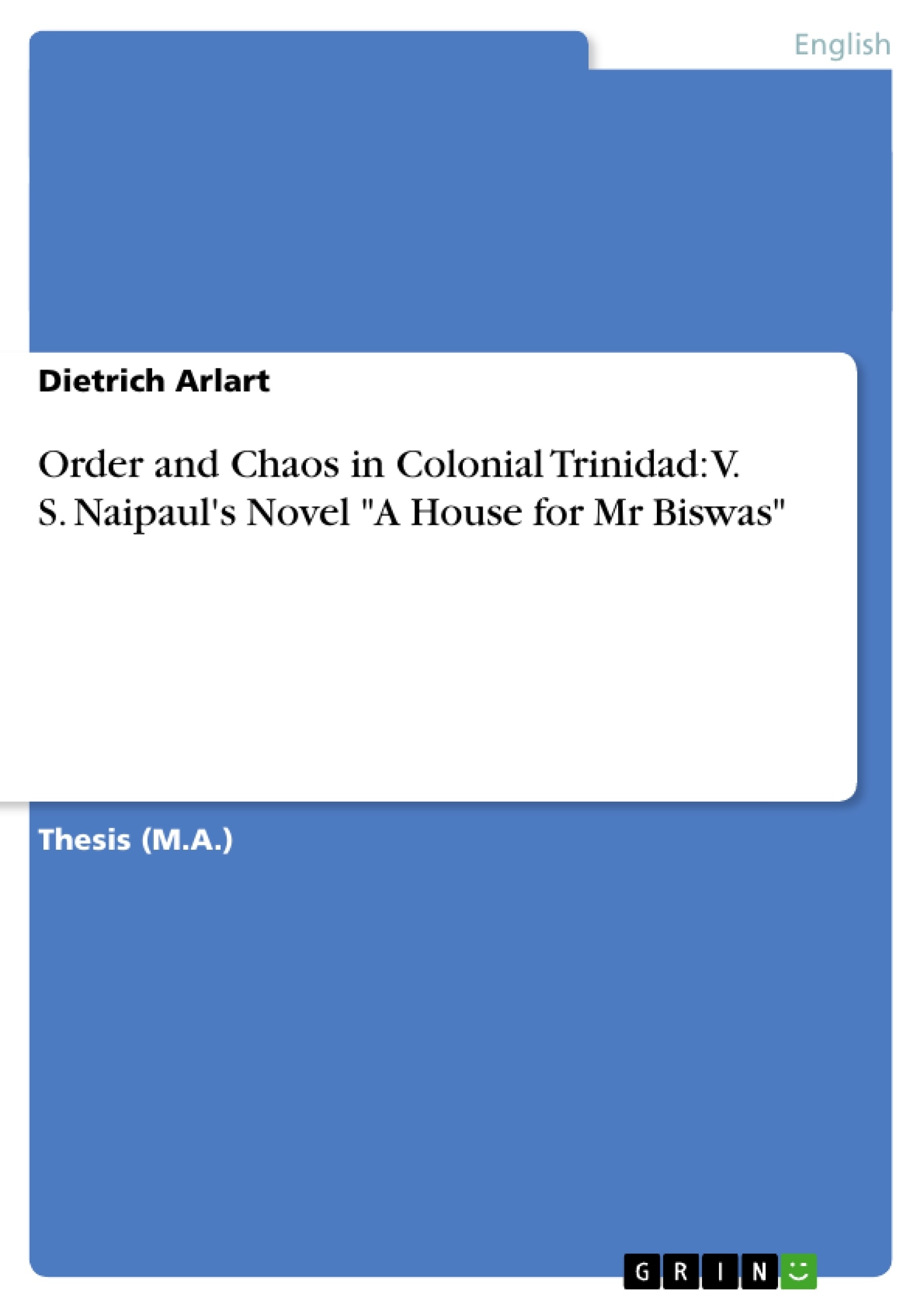Die vorliegende Arbeit befasst sich mit dem ersten großen Roman des aus Trinidad stammenden, in England lebenden Literaturnobelpreisträgers Vidiadhar Surajprasad Naipaul, A House for Mr Biswas. Naipaul schildert aus der Erinnerung den Lebensweg seines eigenen Vaters im spätkolonialen Trinidad, der gekennzeichnet ist vom Kampf um Unabhängigkeit und Eigenständigkeit, von der Suche nach Orientierung und einer gültigen Ordnung in einer von gesellschaftlichen Umwälzungen geprägten Umgebung.
Biswas' individualistische Suche spielt sich ab vor dem Hintergrund einer traditionellen hinduistischen Großfamilie. Das einzigartige gesellschaftliche Gefüge der Westindischen Inseln in der ersten Hälfte des 20. Jahrhunderts und insbesondere das Vorhandensein einer zahlenmäßig beträchtlichen indischen Minderheit bedarf zunächst einer knappen geschichtlichen Herleitung. Die Strukturen und Ordnungsprinzipien der indischen Gesellschaftsgruppe – und die Entwicklungen, denen diese unterworfen sind – werden dann anhand der Tulsis, der Großfamilie, in die Biswas einheiratet, näher beleuchtet.
Im Anschluss daran folgt eine Auseinandersetzung mit Biswas selbst. Zum besseren Verständnis seines Charakters erfolgt zunächst eine Untersuchung seines eigenen familiären Hintergrunds. Dieser bildet eine Erklärungsgrundlage für Biswas' Orientierungsversuche. Verschiedene Orientierungsangebote, die sich ihm im Laufe seines Lebens eröffnen, werden auf ihre Gültigkeit für Biswas hin untersucht. Abschließend wird neben dem Versuch einer Klärung der Ausgangsfrage – konnte Biswas' Sehnsucht nach Ordnung gestillt werden? – auch den Besonderheiten des Autors Naipaul, der Leser und Rezensenten in Ost und West gleichermaßen fasziniert wie polarisiert, einige Aufmerksamkeit gewidmet.
Inhaltsverzeichnis (Table of Contents)
- INTRODUCTION
- EAST INDIANS IN TRINIDAD: A BRIEF HISTORY
- THE TULSIS
- THE ORDER OF TULSIDOM
- Ritual
- Religious Rituals
- Secular Rituals
- Ritual
- CHANGES
- The Weakening of Inherited Notions: The Example of Caste
- The Decline of the East
- THE ORDER OF TULSIDOM
- M. BISWAS, OUTSIDER
- BISWAS'S FAMILIAL BACKGROUND
- The Veil of Memory
- Behind the Veil
- IN SEARCH OF HIS BEARINGS
- A Second Chance, or: Can't the Tulsis Be a Substitute Family?
- Religion
- The Role of Education
- School
- Literature
- Journalism
- 'When Huts of Mud and Grass Are Pulled Down They Leave No Trace': A House for Mr Biswas
- BISWAS'S FAMILIAL BACKGROUND
Zielsetzung und Themenschwerpunkte (Objectives and Key Themes)
This work aims to provide an in-depth analysis of V.S. Naipaul's novel, A House for Mr Biswas, focusing on the protagonist's struggle for independence and self-assertion in the context of colonial Trinidad. It examines the unique societal structure of the West Indian islands in the first half of the 20th century, particularly the East Indian minority, and its impact on Mr Biswas's life.
- The search for order and identity in a society undergoing rapid change
- The impact of colonialism on individuals and communities
- The role of family and tradition in shaping individual experience
- The complexities of cultural identity and belonging
- The influence of social and historical context on individual aspirations
Zusammenfassung der Kapitel (Chapter Summaries)
- Introduction: This chapter sets the stage for the analysis, outlining the author's focus on V.S. Naipaul's life and work. It highlights the importance of understanding the cultural and historical context of colonial Trinidad to fully grasp the novel.
- East Indians in Trinidad: A Brief History: This chapter provides a historical overview of the arrival and settlement of East Indians in Trinidad, highlighting the social and cultural factors that shaped their experiences in a colonial setting.
- The Tulsis: This chapter focuses on the Tulsi family, a prominent East Indian family in Trinidad. It examines the traditional order and social structures within the Tulsi household, including religious and secular rituals, and how these structures influenced the life of Mr Biswas.
- M. Biswas, Outsider: This chapter introduces the protagonist, Mr Biswas, and delves into his familial background, exploring the factors that contributed to his sense of being an outsider within both his family and society. It also examines his search for meaning and identity within the context of colonial Trinidad.
Schlüsselwörter (Keywords)
This work focuses on the themes of colonialism, cultural identity, family, tradition, and social change in the context of colonial Trinidad. It explores the complex relationship between individual aspirations and societal structures, particularly within the East Indian community in Trinidad. Key concepts include the influence of tradition, the search for order and meaning, and the challenges of navigating cultural differences.
- Quote paper
- Dietrich Arlart (Author), 2004, Order and Chaos in Colonial Trinidad: V. S. Naipaul's Novel "A House for Mr Biswas", Munich, GRIN Verlag, https://www.grin.com/document/40522




